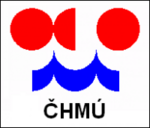Czech Hydrometeorological Institute
The Czech Hydrometeorological Institute (CHMI) is within the Environmental Ministry of the Czech Republic. The head office of the CHMI is located in Prague, the capitol of the Czech Republic.[1][2]
The CHMI has five major divisions:[3]
- Air Quality Control
- Meteorology
- Hydrology
- Information Technology
- Finance and Administration
Regional offices
The CHMI has regional offices located in these seven cities:[3]
- Praha: Located in the Central Bohemia Region, the capitol and the largest city of the Czech Republic, referred to as Prague in English.
- Brno:Located in the South Moravian Region and the second largest city in the Czech Republic.
- Ostrava: Located in the Moravian-Silesian Region and the third largest city in the Czech Republic.
- České Budějovice: Located in the South Bohemia Region and often referred to as Budweis in English.
- Plzeň: Located in the Plzeň Region, the fourth most populous city of the Czech Republic and referred to as Pilsen in English.
- Ústí nad Labem: Located in the Ústí nad Labem Region.
- Hradec Králové: Located in the Hradec Králové Region.
History of the CHMI
Shortly after the establishment of an independent Czechoslovakia (in 1918) at the end of World War I, a National Meteorological Institute was established in 1919 to serve both economic and scientific purposes. At the end of the 1950s and beginning of the 1960s, the Institute became involved in the problems of the environment.
On January 1, 1993, Czechoslovakia peacefully split into two separate nations: the Czech Republic and the Slovak Republic. The National Meteorological Institute was re-named the Czech Hydrometeorological Institute and its charter was amended in June of 1994 and in August of 1995 by the Ministry of the Environment of the Czech Republic.[4][5]
The activities of the Air Quality Control division
The Air Quality Control division has five sections:[6]
- Air Quality Information
- Emissions and Sources
- Modelling and Expertise
- Airborne Monitoring
- Ambient Air Quality Standards
The work of the Modelling and Expertise section is focused upon: the development of air pollution dispersion models, the application of such models in the preparation of expert reports and opinions, forecasts of air quality control, and the processing of operating information on pollutant concentrations obtained by the Airborne Monitoring section.
The SYMOS97 air pollution dispersion model was developed at the CHMI. It models the dispersion of continuous, neutral or buoyant plumes from single or multiple point, area or line sources. It can handle complex terrain and it can also be used to simulate the dispersion of cooling tower plumes.[7]
References
- ↑ New official website of the CHMI (in English)
- ↑ Old officiial website of the CHMI (in English)
- ↑ 3.0 3.1 Organizational Chart
- ↑ Basic information about the CHMI and its history
- ↑ History of CHMI (In the Czech language
- ↑ Structure of the Air Quality Control Division
- ↑ The Model Documententation System (MDS) of the European Topic Centre on Air and Climate Change (part of the European Environment Agency)
